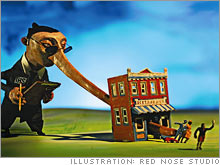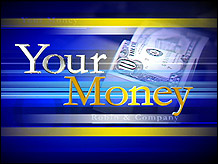IRS may shift AMT gap burden to small bizTo raise revenue, the feds plan to stick their noses deeper into small-business financial records.(FSB Magazine) -- Carson Stanwood has no problem with the Internal Revenue Service going after tax cheats. The founder of Stanwood & Partners Public Relations, based in Jackson Hole, Wyo., understands that paying their taxes in full puts small-business owners like him at a competitive disadvantage against the corner cutters. But when contemplating some of the Treasury Department's recent enforcement proposals - such as vastly expanding the number of Form 1099s he would have to issue and requiring him to verify his independent contractors' taxpayer IDs with the IRS - Stanwood, 47, changes his tune. 
"I applaud them going after this until I hear that it's going to vastly increase my paperwork. I believe it would add 20 to 25 percent to what I pay my bookkeeper - another $6,000 or $7,000 a year - which would suck," says Stanwood, whose firm took in about $1.5 million last year. "That's two or three laptops the employees won't get, smaller Christmas bonuses, or an epic vacation my wife and I don't take." It's not shocking that the IRS is being pushed to improve its reported collection rate of 86 percent. Faced with a gargantuan deficit and demands to reform the alternative minimum tax - a levy initially aimed at the very wealthy that is now snaring millions of middle-income taxpayers - Congress and the Bush administration have been looking for cash under the cushions. And they seem to have found some in an IRS report that shows the amount of unpaid taxes (known as the "tax gap") to be $290 billion a year, of which $109 billion is attributed to underreported business income, largely from small companies. But while no one wants to stand up for tax cheats, Stanwood is in good company when he rejects the proposals made so far: Three trade groups - the U.S. Chamber of Commerce, the National Federation of Independent Businesses and the Small Business Legislative Council - have formed the Coalition for Fairness in Tax Compliance (taxcompliancefairness.org) to ensure that IRS plans don't amount to a swipe at law-abiding business owners, who according to the U.S. Small Business Administration already pay 67 percent more per employee in annual tax-compliance costs than do companies with more than 500 workers ($1,304 vs. $780). "I have no problem with tracking down tax cheats. But I don't believe in creating additional burdens on people who are doing everything right," says Jason Speer, vice president of Quality Float Works, a Schaumburg, Ill., leveling-device company with $2.2 million in annual sales. "Why penalize everyone? That doesn't make sense." From the carpenter who offers discounts for work paid in cash to the freelance designer who doesn't report income from corporate clients he bills less than $600 annually (the limit that trips an IRS Form 1099), some small businesses and independent contractors clearly understate their income on tax forms. IRS data show that independent contractors report 96 percent of the income for which they get information returns (Form 1099, for example), but only 46 percent of income for which they don't. So the administration's budget for the 2008 fiscal year proposes getting more information by making credit card companies report each merchant's credit card sales to the IRS. Another proposal would require businesses to issue a Form 1099 not just to all independent contractors but also to all corporate contractors they pay more than $600 a year (say, the local Roto-Rooter or messenger service). A third proposal would make businesses verify with the IRS the taxpayer ID numbers of all independent contractors and withhold taxes for any who ask. What angers many small-business advocates about the proposals, beyond their invasiveness and red tape, is that they represent a scattershot approach that makes little attempt to target the likeliest tax cheats. IRS data do not break down under-reported business income by transaction type or industry, so the tax authority doesn't know how much revenue is lost to the under-the-table auto mechanic vs. the eBay merchant who doesn't report his credit card sales - or someone else entirely. "There is no data available to identify what payments aren't reported - cash, credit card, under or over $600, business-to-business, business-to-consumer," says Macey Davis, tax counsel at the NFIB (nfib.com). The administration is "coming up with proposals prematurely without data to back them up." It's easy to see how small businesses could feel unjustly picked on. A study from Citizens for Tax Justice (ctj.org) found that through tax breaks and shelters, profitable Fortune 500 companies paid an effective corporate tax rate of 17 percent in 2002 and 2003, far below the 31 percent paid by the average company with less than $2.5 million in annual revenue. "We have 20 employees. We don't have the advantages of a big company with accountants and tax shelters," says Quality Float Works' Speer, who says his company, an S corporation, paid 28 percent in taxes on net income after expenses in 2005. Finally, for all the burden they would impose on small business, these three enforcement proposals would fill less than one tenth of 1 percent of the tax gap, collecting $187 million in 2008 and $19.2 billion over the next ten years. By comparison, improving tax collection on offshore accounts held by U.S. residents would generate about $50 billion a year, estimates Reuven Avi-Yonah, a professor at the University of Michigan Law School. It's no surprise, then, that business owners such as Carson Stanwood have little desire to make the effort to comply with IRS rules of dubious efficacy. "If the IRS wants this money, go find it yourself," he says. "I'm not going to do it for you. I don't have the time." To give feedback, please write to fsb_mail@timeinc.com. ----------------------- Small biz caught in health care tug-of-war From the April 1, 2007 issue
|
Sponsors
|

